|
|
|
Sort Order |
|
|
|
Items / Page
|
|
|
|
|
|
|
| Srl | Item |
| 1 |
ID:
120928
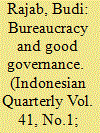

|
|
|
| 2 |
ID:
084035
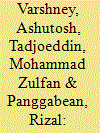

|
|
|
|
|
| Publication |
2008.
|
| Summary/Abstract |
Indonesia has witnessed explosive group violence in recent years, but unlike its plentiful economic statistics, the data on conflict are remarkably sketchy. Because the New Order (1966-1998) wanted to give the appearance of order and stability, it did not believe in publishing reports on group conflict, nor did it allow researchers and nongovernmental organizations to probe the patterns and causes of conflict. This article is based on the first multiyear dataset ever constructed on group violence in Indonesia. Following, and adapting for Indonesian conditions, methodologies developed and used elsewhere, we cover the years 1990-2003, split the data into various categories, and identify the national, regional, and local patterns of collective violence. Much that we find is surprising, given the existing theories and common perceptions about violence in Indonesia. Of the several conclusions we draw, the most important one is that group violence in Indonesia is highly locally concentrated. Fifteen districts and cities (kabupaten and kota), in which a mere 6.5 percent of the country's population lived in 2000, account for as much as 85.5 percent of all deaths in group violence. Large-scale group violence is not as widespread as is normally believed. If we can figure out why so many districts remained reasonably quiet, even as the violent systemic shifts-such as the decline of the New Order-deeply shook fifteen districts causing a large number of deaths, it will advance our understanding of the causes of collective violence in Indonesia.
|
|
|
|
|
|
|
|
|
|
|
|
|
|
|
|
| 3 |
ID:
120927


|
|
|
| 4 |
ID:
154311
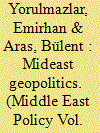

|
|
|
| 5 |
ID:
124298
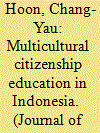

|
|
|
|
|
| Publication |
2013.
|
| Summary/Abstract |
This study investigates how multicultural citizenship education is taught in a Chinese Christian school in Jakarta, where multiculturalism is not a natural experience. Schoolyard ethnographic research was deployed to explore the reality of a 'double minority' - Chinese Christians - and how the citizenship of this marginal group is constructed and contested in national, school, and familial discourses. The article argues that it is necessary for schools to actively implement multicultural citizenship education in order to create a new generation of young adults who are empowered, tolerant, active, participatory citizens of Indonesia. As schools are a microcosm of the nation-state, successful multicultural citizenship education can have real societal implications for it has the potential to render the idealism enshrined in the national motto of 'Unity in Diversity' a lived reality.
|
|
|
|
|
|
|
|
|
|
|
|
|
|
|
|
| 6 |
ID:
162371


|
|
|
| 7 |
ID:
134045
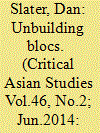

|
|
|
|
|
| Publication |
2014.
|
| Summary/Abstract |
Political blocs and cleavages do not emerge and endure unless political parties construct and cultivate them. When Indonesia democratized in the late 1990s, it appeared that party competition would be characterized by two primary cleavages that had been incubated under Suharto's "New Order": a regime cleavage pitting reformist opponents of the fallen dictatorship against its holdovers, and a religious cleavage distinguishing parties by their views on the proper political role for Islam. Some fifteen years after Suharto's departure, neither a reformist nor a religious bloc exists in Indonesian politics. This is not because reformist and religious themes lack resonance among voters, but because party elites have effectively abandoned cleavage politics by promiscuously sharing power in an all-encompassing party cartel. Party leaders have behaved as if they are more accountable to each other than to their presumptive support blocs, leaving reformist and religious social forces without reliable party champions in national politics. This article traces the origins of Indonesia's "accountability deficit" to the elite deal making that accompanied the formation of the country's first democratic governing coalitions in 1999 and 2001. By promiscuously sharing power across cleavage lines, party leaders fostered voter de-alignment in the 2004 and 2009 elections. This de-alignment has left Indonesian democracy vulnerable to the highly unpredictable politics of individuals rather than the more predictable politics of institutions as the 2014 elections approach, ominously opening the door to populist and anti-system challengers striving to rebuild the political blocs that party elites have recently unbuilt.
|
|
|
|
|
|
|
|
|
|
|
|
|
|
|
|
|
|
|
|
|